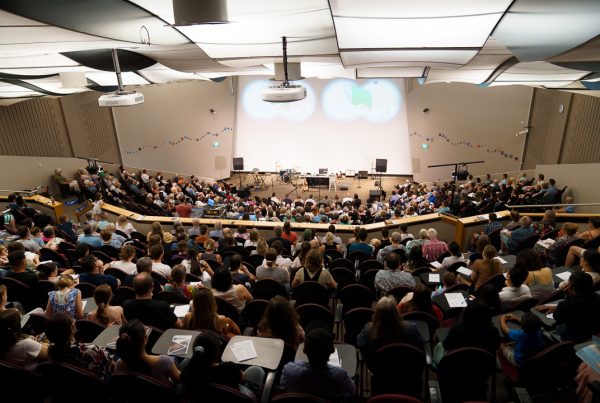15 January 2017
Friends, as part of his MTS ministry traineeship, Steve and I have been discussing Broughton Knox’s The Everlasting God. I was the very first generation of students to begin at Moore College who did not receive a single lecture from Dr Knox, its Principal prior to Peter Jensen. Dr Knox’s theology has been pivotal in shaping Anglican churches in our diocese, but somehow I never got round to reading his book until this year.
His writing is slightly old-fashioned but wonderfully simple, jargon-free and penetrating. Among other things, Knox was famous for his focus on the theme of fellowship, which he grounded in God’s trinitarian nature. Here is a sample, which we read last week:
The doctrine [of the Trinity] also sheds light on our understanding of human life. From it we realize that personal relationship is the essence of reality, and we also learn something of the quality of that relationship. It is a relationship of other-person-centredness. The Father loves the Son and gives him everything (John 3:35). The Son always does that which pleases the Father (John 8:29). The Spirit takes of the things of the Son and shows them to us. He does not glorify himself. (John 16:13-15). [… W]e also learn that the way this relationship should be expressed is by concern for others. When Jesus lived among us he summed up his own life by the phrase: “I am among you as the one who serves.” (Luke 22:27). [The Everlasting God, Matthias Media, 2009, pp76-77]
The St Michael’s vision statement picks this up when it declares we want to be “growing churches of real community”. But true community is always an area for growth.
Often people will ask me if I have noticed that ‘So-and-so’ is missing lately on Sundays. Sometimes the answer is yes, sometimes no. Usually the implication is that as the pastor, I should phone. Perhaps so. And very often one of the pastoral staff does. Hopefully we try to be encouraging. But with well over 500 adults on our roll, sometimes people fall through the gaps. And who wants to be cared for only by people they know are being paid to do so?
So that’s why I was so delighted recently, when a congregation member noted a person who normally sits near them had been away. Then she said she supposed she should ring them, although unsure if she knew the absentee well enough. I thought this was exactly the time when a phone call from another caring person at church would be just right. So I encouraged her to look the person up in our church directory and to ring just to see how they were.
Of course, James 5:14 says that if someone is sick, they may call the elders of the church to pray for them. But notice two things. Firstly the elders are not mind-readers and will often need to be told someone would like a visit. Secondly, elders in the Bible are not just the paid pastoral staff, but a wider group of mature Christians leaders (whether ordained or not).
In fact, as I have said before, from Matthew 25:39-40, visiting the sick or the lonely or downcast is every Christian’s job! (See also 1 Thessalonians 5:14.) So ask yourself whom you should visit or phone to encourage. They don’t need to be bosom buddies first.
Dr Mark Thompson recently wondered whether “[W]e talk a good game when it comes to the priority of relationships while our practice is practically indistinguishable from the relational desert inhabited by those around us.” As he asked, do we as individuals in the church need to address a “disconnect between our confession and life” at this point?
Warmly in Christ,
Sandy Grant
Senior Minister





